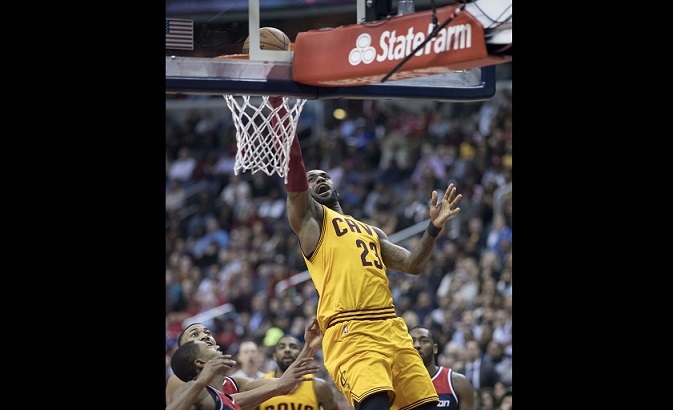
The 32-year-old still looks like he’s in his prime
INDEPENDENCE, Ohio — Except for his backpedaling hairline, LeBron James shows no visible signs of age.
At 32, still in his prime, and still at the top of his game, he’s defying time.
“Benjamin Button,” Cavaliers coach Tyronn Lue called him, referring to the fictional character who ages backward.
LeBenjamin?
Following a regular season in which he averaged more minutes per game (37.8) than any player, James logged 43.7 per game during Cleveland’s tougher-than-it-looked sweep over the Indiana Pacers in the first round of the playoffs. And as James and the defending champions await either Toronto or Milwaukee in the second round, James is taking advantage of the down time.
Not that he might need it.
Lue spent much of the season defending his use of James, who in all honesty is really the one in control of when he sits or doesn’t. At this point, Lue has given up worrying about resting the superstar.
“I don’t understand why people make a big deal out of his minutes,” Lue said Wednesday. “He had a week off before the series started. We won four straight games and then he had a week off again. So next he might play 48 minutes. … Bron today just said he feels worse when he doesn’t play.”
James wasn’t available for interviews as the team gathered for the first time in two days at Cleveland Clinic Courts, and it’s likely that he won’t speak to the media until the Cavs have a second-round opponent.
But as has been the case for months, James’ playing time was one of the prime topics presented to Lue, who believes that the four-time MVP’s heavy workload during the regular season is what enables him to play at such high levels in the postseason.
Consider that James averaged 32.8 points, 9.8 rebounds and 9.0 assists, shot 54 percent from the field, went 9 of 20 on 3-pointers and led the Cavaliers to the biggest second-half comeback in league history during the series against Indiana, and it’s easy to see why Lue wants to move past the minutes chatter.
“With him playing the minutes he played during the course of the regular season, it has helped him in the playoffs,” Lue said. “Now he is able to play those 42, 43 minutes. Because he’s used to it. His body can take it, so, I’m not worried about what outside people say.”
Unlike the regular season, when brutal travel schedules, back-to-backs and stretches of three games in four nights can wear players down, the postseason allows for recovery. Lue also thinks too many teams are allowing outside pressures to influence how they use players.
“Teams are suffering,” he said, “because they listen to what the media is saying about guys playing minutes” and “some teams should play some guys more minutes, and it would’ve been different (playoff) series.”
James has ramped up his minutes nearly every postseason. Now in his 12th playoffs, he averaged 39.1 minutes last year and has only twice averaged less than 40 per game.
Lue trusts that the three-time champion knows how far to push himself without reaching his breaking point.
“He knows his body better than anyone,” Lue said. “He said he feels great and he feels worse when he doesn’t play, so we’ll see how that works out.”
As for the rest of the Cavaliers, Wednesday included some competition in the team’s weight room on an aerobic conditioning machine while the team’s in-house DJ from Quicken Loans Arena spun music. After the vigorous workouts, yoga mats were dragged onto the court and the facility’s lights were dimmed for some stretching and decompression.
Namaste, NBA-style.
The Cavs had a similar, one-week break between the first and second rounds last season. Kyrie Irving said it’s imperative to make the most of it.
“The mental preparation and physical preparation starts now and hasn’t stopped,” he said. “Took a brief day off or two and now just get back to work and get ready for whichever team we’re getting ready for. The work never stops.”










